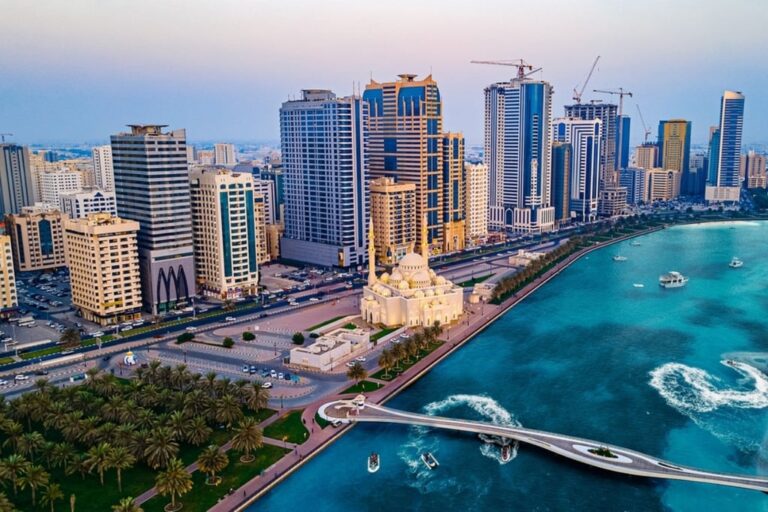Sharjah, frequently overshadowed by its more glamorous neighbours in the United Arab Emirates, is forging a distinctive path in the region’s tourism sector.
With a substantial $2.75B foreign direct investment initiative, the emirate is swiftly establishing itself as a leader in eco-tourism, integrating luxury with sustainability in a manner that attracts visitors while setting new standards for environmentally friendly travel in the Middle East, according to the CEO of the city’s investment authority.
The emirate’s dedication to sustainable development is more than just a trendy term – it is a central principle driving Sharjah’s growth strategy, says Ahmad Al Qaseer, CEO of the Sharjah Investment and Development Authority (Shurooq).
“It would not be an exaggeration to say that Sharjah is one of the largest providers of eco-tourism not only in the UAE but also in the wider region,” Al Qaseer told Arabian Business.
“We are committed stakeholders in the UAE’s goal to achieve net zero emissions by 2050 and the UN’s global Agenda 2030 for Sustainable Development Goals (SDGs). Since our inception in 2009, we have demonstrated our commitment with pioneering concepts and projects of various scales that set the benchmark for eco-friendly tourism locally and beyond.”
Sharjah’s eco-tourism projects
Sharjah’s eco-tourism portfolio includes several ambitious and innovative projects that are redefining the landscape of sustainable travel in the region.
One such project is The Sharjah Collection – a series of retreats that provide visitors with the opportunity to stay in protected areas and heritage sites recognised by the UN.
“The Sharjah Collection includes luxury lodges and boutique hotels in some of Sharjah’s most distinctive locations. Each property is designed to immerse guests in the emirate’s natural beauty and rich culture while minimising environmental impact,” said Al Qaseer.
The Nomad Project, set against the backdrop of the Kalba mountains, features eco-friendly trailers and combines adventure tourism with ecological responsibility.
“As the name suggests, these eco-friendly trailers nestled in Sharjah’s Kalba mountains will offer guests a truly unique experience as they connect with nature and discover ancient petroglyphs while leaving behind a very minimal environmental footprint,” Al Qaseer explained, adding that visitors have the chance to explore Sharjah’s rugged natural landscape without compromising on comfort or sustainability.
Another notable project is the boutique Al Faya Retreat, which has been fashioned from 1960s stone buildings. The Shurooq CEO believes this exemplifies Sharjah’s “ability to repurpose historical structures into modern, eco-friendly accommodations.”
“It’s a perfect blend of Sharjah’s past and future,” he said.
The Kingfisher Retreat is also part of this multifaceted effort, allowing guests to engage directly with environmental protection initiatives.
And perhaps one of Sharjah’s most innovative projects is the Mysk Moon Retreat. This lunar-domed glamping site offers a unique desert experience with minimal environmental impact.
“It combines futuristic design with traditional Bedouin hospitality, all while adhering to strict ecological principles. It’s a perfect example of how luxury and sustainability can coexist.”
However, Sharjah’s approach to eco-tourism extends beyond merely offering green accommodations. It encompasses a holistic view of sustainability that includes waste management, local sourcing, and cultural preservation.
Al Qaseer highlighted this comprehensive strategy. “Our eco-tourism initiatives are designed to touch every aspect of the visitor experience. From waste reduction and energy efficiency in our accommodations to supporting local artisans and farmers, we’re creating a sustainable ecosystem that benefits both our visitors and our communities.”
For instance, The Chedi Al Bait, Sharjah, sources its produce from local organic farms, reducing its carbon footprint while supporting the local economy.
“These offerings have resonated well with tourists from around the world,” Al Qaseer added. “We’re seeing a growing demand for authentic, sustainable travel experiences, and Sharjah is uniquely positioned to meet this demand.”
Economic impact
The economic impact of Sharjah’s eco-tourism initiative has been significant. Mohamed Al Musharrakh, CEO of Invest in Sharjah, noted that the emirate has seen impressive growth in foreign direct investment (FDI) in recent years.
In 2023, Sharjah experienced a remarkable 2,064 percent increase in capital expenditure on greenfield FDI projects, with 19 new projects securing a total investment of $2.75B and creating over 1,500 jobs.
The tourism sector, in particular, has been a strong performer. Al Qaseer reported impressive occupancy rates for the Sharjah Collection luxury hospitality properties – 93 percent during high season and 72 percent during off-peak season.
“These figures demonstrate the strong appeal of our eco-tourism offerings,” he said.
Looking to the future, Al Qaseer is optimistic about Sharjah’s potential in the eco-tourism market. “As global awareness of environmental issues continues to grow, we believe that destinations offering truly sustainable travel experiences will see increased demand. Sharjah is well-positioned to capitalise on this trend, and we’re continually exploring new ways to enhance our eco-tourism offerings.”
Cultural tourism has long been one of the emirate’s most important sub-sectors. “Shurooq destinations like House of Wisdom, the Maraya Art Centre and 1971 Design Space, or Heart of Sharjah, The Flag Island, Al Noor Island have all been built to further intensify Sharjah’s cultural appeal,” said Al Qaseer, adding that he anticipates “robust growth and investor interest” this year.
Despite the success of Sharjah’s eco-tourism initiatives, challenges remain. Balancing development with conservation, managing visitor impact on sensitive ecosystems, and educating tourists about responsible travel practices are ongoing concerns.
However, Al Qaseer sees these challenges as opportunities for innovation.
“Every challenge in sustainable tourism is an opportunity to develop new solutions,” he stated.
“We’re constantly learning and adapting our approaches to ensure that our growth in tourism doesn’t come at the expense of our natural and cultural heritage.”
As Sharjah continues to develop its eco-tourism sector, the emirate is setting its sights on becoming a global leader in sustainable travel.
“Our goal is not just to attract visitors, but to transform the way people think about travel. We want to show the world that luxury and sustainability are not mutually exclusive, and that responsible tourism can be a powerful force for positive change,” said Al Qaseer.


